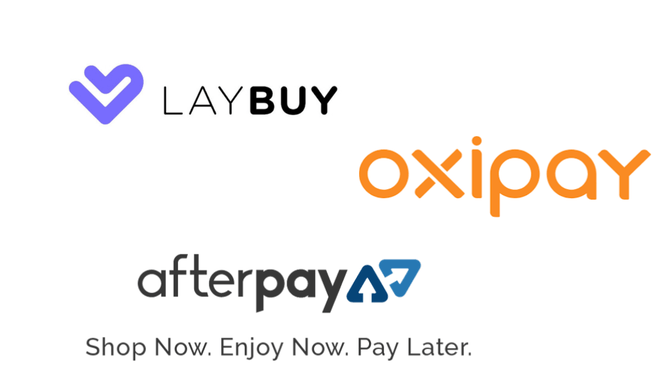Buy now, pay later schemes have been around for a long time and were generally termed as Hire Purchases. Traditional credit cards are also essentially a Buy Now, Pay Later type thing as well.
However, in recent years a new bit of financial technology has emerged that is taking the world of retail, especially online shopping, by storm. Systems that allow you to pay off your purchase with staged payments over a specific number of weeks, with no added interest to the purchaser, have started to appear on many online stores and in store as well. Afterpay, Laybuy, Oxipay and Part Pay are the main options currently with all slightly different offerings and structures.
A brief explanation of how they work
We're not going to go into specifics of all the systems and how they work, you can check out their websites for that but basically it goes like this.
- You make a purchase (usually they have to be under about $1000)
- You sign up for an account with the specific buy now, pay later system
- You enter your credit card details
- They charge the first payment to your credit card straight away
- Then over the next 5 - 8 weeks (depending on the service) they charge equal payments to your credit card until the purchase is paid off.
Easy as that. And best of all, it is free* to you the consumer.
*unless you miss a payment and then you are charged. Check their websites for associated charges.Hang on, how do they make their money?
The cost is actually passed onto the person selling the goods to you. A normal credit card transaction might cost the seller 3.5% of the purchase where as using a buy now, pay now system is around 5% cost to the seller. Why would sellers do this? Well, the research shows people will spend up to 60% more when they have these buy now pay later options so sellers are happy to pay a higher percentage when they can get larger and more frequent sales.
So the service really is free to you, the consumer, unless you miss payments and then it can become an issue.
So, why do the banks even care?
Why do the banks care about these small, short term and sometimes "historic" payments.
Well, it all comes down to risk and liability. If a bank is lending you money (and normally a lot of money), they need to know about all the other liabilities (money owing) regardless of how big as essentially those liabilities can impact your ability to pay them back. The banks always want to be the first inline to be paid and so other debts present themselves as risk to the bank.
When the banks see these small repeating payments to things like Afterpay, Laybuy, Part Pay or Oxipay, they add them into their calculators as a cost in your budget even though they have a very close end date to them. Why do they add them as a permanent cost when they have a short end time though? They think, and they are probably justified in thinking this way, that if you've used these types of services in the past, you'll probably continue using them in the future so they add that cost into your ongoing cost of living.
Is this fair for them to add them in ongoing? Maybe not (like any addict, "I can stop at any time!") but that is what they do and so you need to know that the "why not just pay it off, it's interest free?" mentality might actually hinder the moment you are able to borrow for you first, second or even 10th home loan.
Takeaways
- Are these types of buy now, pay later schemes useful? Absolutely and they are interest free which is great.
- Can they affect your borrowing potential? Definitely as the banks assume these are ongoing costs.
If you are looking to buy a new property, and are wanting to make sure your finances are in the best possible position for the banks to not have any reason to question things, contact My Mortgage to get our Free Budgeting template. Regardless of whether you are a first home buyer, you're selling a home and buying again, building or renovating or looking to invest, a good budget will help you achieve that.


